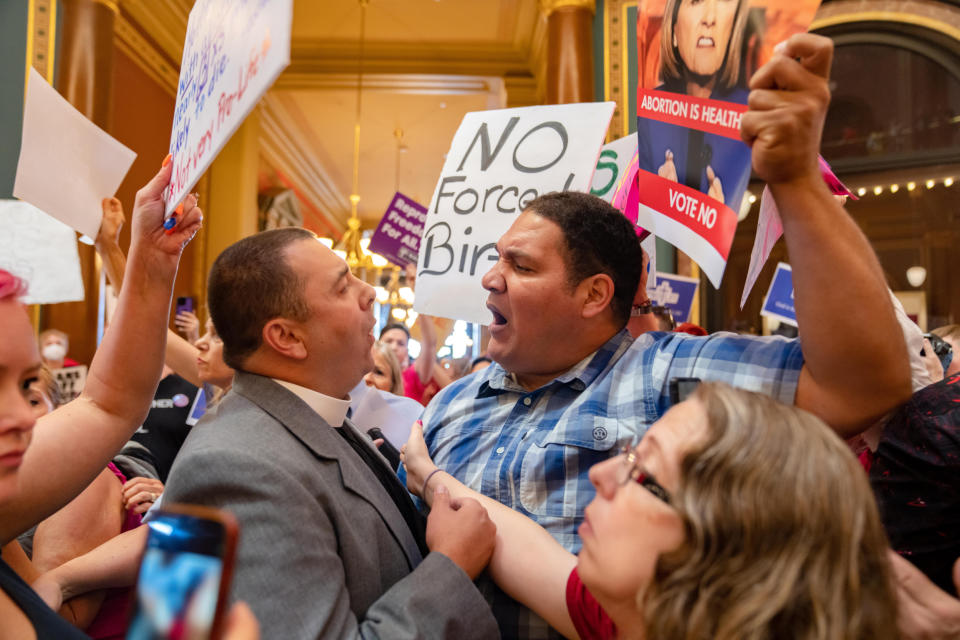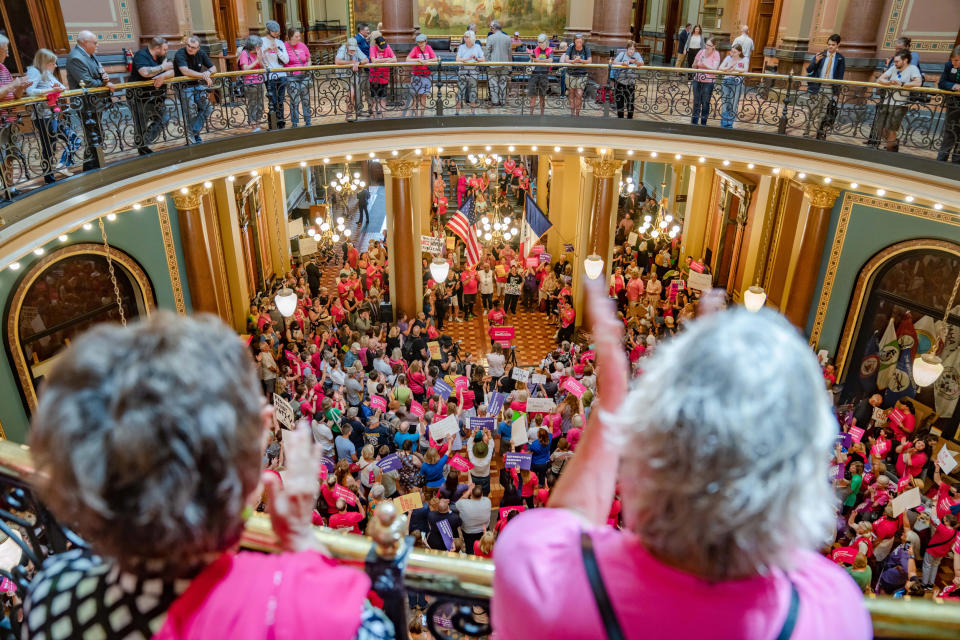Iowa Republicans pass a new 6-week abortion ban
Iowa Republicans passed a bill late Tuesday to ban most abortions after six weeks — a restrictive measure that would quickly remake the reproductive rights legal landscape in a key early voting state.
The measure passed, mostly along party lines, just after 11 p.m. local time, capping a marathon one-day special legislative session that Republican Gov. Kim Reynolds called for the sole purpose of enacting “pro-life” legislation.
Reynolds, in a statement issued moments after the bill was passed, said she would sign the bill on Friday.
"Justice for the unborn should not be delayed," Reynolds said.
If it is not blocked by a court, the law would go into effect immediately after Reynolds signs it — which could send abortion clinics in the state, as well as women with appointments scheduled at them in coming days and weeks, scrambling. As it currently stands, abortion remains legal in Iowa until the 20th week of pregnancy.
The bill passed by Republicans, who control the Legislature, would ban abortions at the sixth week of pregnancy — or when, in some cases, a fetal pulse can first be heard via ultrasound. The measure includes exceptions for the life of the woman, miscarriages and fetal abnormalities deemed by a physician "incompatible with life."
The bill also includes exceptions for pregnancies resulting from rape and from incest. For those exceptions to apply, the rape must have been reported to law enforcement or a “public or private health agency” — which includes a family doctor — within 45 days, and the incest must have been reported to any of those officials or entities within 140 days.

Passage Tuesday was the product of a rapid, 15-hour special legislative session that featured hours of impassioned pleas from legislators and members of the public — in both support of and opposition to the measure.
“Abortion is normal, safe, lifesaving health care,” Connie Ryan, the executive director of the nonprofit Iowa Interfaith Alliance, said at a session reserved for members of the public to discuss the measure. “Iowa is not a theocracy."
Democratic legislators and reproductive rights groups held large protests in the state Capitol throughout the day, with chants audible during several committee sessions where the bill was discussed.
“It’s pretty demoralizing for those of us that take care of women to have the potential of losing the ability to practice full-spectrum care,” said Dr. Amy Bingaman, a Des Moines obstetrician and gynecologist. Bingaman said many doctors like her will be forced to consider leaving the state if they are no longer able to legally administer reproductive health care.

Abortion-rights protesters were seen clashing at times with Iowans who showed up in support of the ban.
“Life is precious,” said Vicki Miller, who supported the ban. “The Bible tells us that … as soon as that child is conceived as a child, it’s alive.”
The new ban is certain to affect the 2024 presidential race.
Because Iowa will be the first state to hold Republican caucuses, GOP candidates already barnstorming the state are certain to be asked for their views on the ban. Republicans have often struggled to talk to voters about abortion rights in the year since the Supreme Court’s Dobbs ruling overturned Roe v. Wade. However, support for stronger abortion restrictions remains popular among conservative evangelical Christians — a key voting bloc in the state’s Republican caucuses.
But polling in the state, as well as nationally, finds that a majority of voters support people’s having the right to abortions — which could make any candidate’s support of a strict abortion ban a political vulnerability among general election voters.
Keeping the issue in plain view in the state will be a summit a prominent Christian conservative group will hold in Des Moines this week. Florida Gov. Ron DeSantis, former Vice President Mike Pence, former South Carolina Gov. Nikki Haley, Sen. Tim Scott of South Carolina and businessman Vivek Ramaswamy are some of the candidates scheduled to attend.
Ramaswamy, who went to the Capitol building to support the session, faced hecklers during an interview.
“I think it’s an historic occasion,” Ramaswamy said, adding that it was “a celebration of the pro-life position that I share.”
With Republicans in firm control of both chambers of the Legislature, Democrats lacked the numbers and the tools to delay passage of the bill beyond the late-night period legislators reserved for debate and voting.
Reproductive rights groups, including Planned Parenthood, suggested they would challenge the measure in court.
"This is not the end of our fight for safe and legal abortion and reproductive health care," Ruth Richardson, the president and CEO of Planned Parenthood North Central States, said in a statement after the bill was passed. "We will exhaust all options to ensure Iowans have control of their bodily autonomy, now and for generations to come.”
The latest bill is nearly identical to a six-week ban that remains permanently blocked following an Iowa Supreme Court ruling last month. The split decision effectively allowed a lower court’s ruling blocking the law to remain in effect.
If the new law is enacted after Reynolds signs it, it is likely to face some of the same legal roadblocks — but the outcome could be different with a full state Supreme Court issuing a decision.
The state Supreme Court’s split ruling was a narrowly tailored decision based largely on procedural grounds, meaning it remains possible — if not likely — that a full seven-member court could find legal consensus on a new ban.
One of the court’s seven justices, Dana Oxley — a Reynolds appointee — recused herself because her former law firm represented an abortion clinic that was a plaintiff in the original case.
The split decision last month featured three justices suggesting they could support a legal standard — known as “rational basis” — that could allow a six-week abortion limit to stand in the future.
If Oxley were part of the next decision, a clear, legally binding majority on a six-week ban would most likely result.
This article was originally published on NBCNews.com
